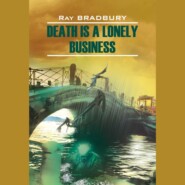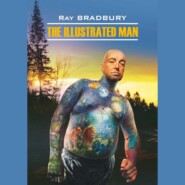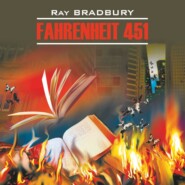По всем вопросам обращайтесь на: info@litportal.ru
(©) 2003-2024.
✖
Ray Bradbury Stories Volume 1
Настройки чтения
Размер шрифта
Высота строк
Поля
‘That’s an antique chair, so be gentle,’ warned Aunt Tildy. ‘Start again, tell me things you got to tell, I’ll listen respectful. But keep your voice in your shoes and stop starin’ at me with funny lights in your eyes. Land, it gives me the collywobbles.’
The bone-porcelain, flowered clock on the mantel finished chiming three. Out in the hall, grouped around the wicker basket, four men waited, quietly, as if they were frozen.
‘Now, about that wicker basket,’ said Aunt Tildy. ‘It’s past six feet long, and by the look, it ain’t laundry. And those four men you walked in with, you don’t need them to carry that basket – why, it’s light as thistles, Eh?’
The dark young man was leaning forward on the antique chair. Something in his face suggested the basket wouldn’t be so light after a while.
‘Pshaw,’ Aunt Tildy mused. ‘Where’ve I seen a wicker like that before? Seems it was only a couple years ago. Seems to me – oh! Now I remember. It was when Mrs Dwyer passed away next door.’
Aunt Tildy set her coffee cup down, sternly. ‘So that’s what you’re up to? I thought you were workin’ to sell me somethin’. You just set there until my little Emily trounces home from college this afternoon! I wrote her a note last week. Not admittin’, of course, that I wasn’t feelin’ quite ripe and pert, but sort of hintin’ I want to see her again, it’s been a good many weeks. Her livin’ in New York and all. Almost like my own daughter. Emily is.
‘Now, she’ll take care of you, young man. She’ll shoo you out’n this parlor so quick it’ll—’
The dark young man looked at Aunt Tildy as if she were tired.
‘No, I’m not!’ she snapped.
He weaved back and forth on the chair, half shutting his eyes, resting himself. O, wouldn’t she like to rest, too? he seemed to murmur. Rest, rest, nice rest …
‘Great sons of Goshen on the Gilberry Dike! I got a hundred comforters, two hundred sweaters and six hundred potholders in these fingers, no matter they’re skinny! You run off, come back when I’m done, maybe I’ll talk to you.’ Aunt Tildy shifted subjects. ‘Let me tell you about Emily, my sweet, fair child.’
Aunt Tildy nodded thoughtfully. Emily, with hair like yellow corn tassels, just as soft and fine.
‘I well remember the day her mother died, twenty years ago, leavin’ Emily to my house. That’s why I’m mad at you and your wickers and such goin’s-on. Who ever heard of people dyin’ for any good cause? Young man, I don’t like it. Why, I remember—’
Aunt Tildy paused; a brief pain of memory touched her heart. Twenty-five years back, her father’s voice trembled in the late afternoon:
‘Tildy,’ he whispered, ‘what you goin’ to do in life? The way you act, men don’t walk much with you. You kiss and skedaddle. Why don’t you settle down, marry, raise children?’
‘Papa,’ Tildy shouted back at him. ‘I like laughin’ and playin’ and singin’. I’m not the marryin’ kind. I can’t find a man with my philosophy, Papa.’
‘What “philosophy’s” that?’
‘That death is ridiculous! It run off with Mama when we needed her most. You call that intelligent?’
Papa’s eyes got wet and gray and bleak. ‘You’re always right, Tildy. But what can we do? Death comes to everybody.’
‘Fight!’ she cried. ‘Strike it below the belt! Don’t believe in it!’
‘Can’t be done,’ said Papa sadly. ‘We all stand alone in the world.’
‘There’s got to be a change sometime. Papa. I’m startin’ my own philosophy here and now! Why, it’s silly people live a couple years and are shoved like wet seeds in a hole; but nothin’ sprouts. What good do they do? Lay there a million years, helpin’ no one. Most of them fine, nice, neat people, or at least tryin’.’
But Papa wasn’t listening. He bleached out, faded away, like a photo left lying in the sun. She tried to talk him out of it, but he passed on, anyway. She spun about and ran. She couldn’t stay on once he was cold, for his coldness denied her philosophy. She didn’t attend his burial. She didn’t do anything but set up this antique shop on the front of an old house and live alone for years, that is, until Emily came. Tildy didn’t want to take the girl in. Why? Because Emily believed in dying. But her mother was an old friend and Tildy had promised help.
‘Emily,’ continued Aunt Tildy, to the man in black, ‘was the first to live in this house with me in all the years. I never got married. I feared the idea of livin’ with a man twenty-thirty years and then have him up and die on me. It’d shake my convictions like a house of cards. I shied off from the world. I screamed at people if they so much as mentioned death.’
The young man listened patiently, politely. Then he lifted his hand. He seemed to know everything, with the dark, cold shining of his eyes, before she opened her mouth. He knew about her and World War II, when she shut off her radio forever and stopped the newspapers and beat a man’s head with an umbrella, driving him from her shop when he insisted on describing the invasion beaches and the long, slow tides of the dead drifting under the silent urgings of the moon.
Yes, the dark young man smiled from the antique rocker, he knew how Aunt Tildy had stuck to her nice old phonograph records. Harry Lauder singing ‘Roamin’ in the Gloamin’,’ Madame Schumann-Heink and lullabies. With no interruptions, no foreign calamities, murders, poisonings, auto accidents, suicides. Music stayed the same each day, every day. So the years ran, while Aunt Tildy tried to teach Emily her philosophy. But Emily’s mind was fixed on mortality. She respected Aunt Tildy’s way of thinking, however, and never mentioned – eternity.
All this the young man knew.
Aunt Tildy sniffed. ‘How do you know all those things? Well, if you think you can talk me into that silly wicker basket, you’re way off the trestle. You lay hands on me, I’ll spit right in your face!’
The young man smiled. Aunt Tildy sniffed again.
‘Don’t simper like a sick dog. I’m too old to be made love at. That’s all twisted dry, like an old tube of paint, and left behind in the years.’
There was a noise. The mantel clock chimed three. Aunt Tildy flashed her eyes to it. Strange. Hadn’t it chimed three o’clock just five minutes ago? She liked the bone-white clock with gold angels dangling naked about its numeraled face and its tone like cathedral bells, soft and far away.
‘Are you just goin’ to sit there, young man?’
He was.
‘Then, you won’t mind if I take a little cat nap. Now, don’t you stir off that chair. Don’t come creepin’ around me. Just goin’ to close my eyes for a spell. That’s right. That’s right …’
Nice and quiet and restful time of day. Silence. Just the clock ticking away, busy as termites in wood. Just the old room smelling of polished mahogany and oiled leather in the Morris chair, and books sitting stiff on the shelves. So nice. Nice …
‘You aren’t gettin’ up from the chair, are you, mister? Better not. I got one eye open for you. Yes, indeed I have. Yes, I have. Oh. Ah, hmmmm.’
So feathery. So drowsy. So deep. Under water, almost. Oh, so nice.
Who’s that movin’ around in the dark with my eyes closed?
Who’s that kissin’ my cheek? You, Emily? No. No. Guess it was my thoughts. Only – dreamin’. Land, yes, that’s it. Driftin’ off, off, off …
Ah? What say? Oh!
‘Wait while I put on my glasses. There!’
The clock chimed three again. Shame, old clock, now, shame. Have to have you fixed.
The young man in the dark suit stood near the door. Aunt Tildy nodded.
‘You leavin’ so soon, young man? Had to give up, didn’t you? Couldn’t convince me; no, I’m mule-stubborn. Never get me free of this house, so don’t bother comin’ back to try!’
The young man bowed with slow dignity.
He had no intention of coming again, ever.
‘Fine,’ declared Aunt Tildy. ‘I always told Papa I’d win! Why, I’ll knit in this window the next thousand years. They’ll have to chew the boards down around me to get me out.’
The dark young man twinkled his eyes.
‘Quit lookin’ like the cat that ate the bird,’ cried Aunt Tildy. ‘Get that old fool wicker away!’
The four men trod heavily out the front door. Tildy studied the way they handled an empty basket, yet staggered with its weight.

















